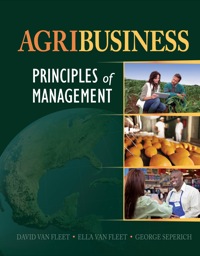Many years ago a popular show did a comedy skit that was a parody of television food
Question:
Many years ago a popular show did a comedy skit that was a parody of television food advertising.
The skit featured a husband and wife arguing whether the whipped-cream product they were featuring was a floor wax or a dessert topping. The absurdity of the juxtaposition of these two uses made for good comedy.
Fast forward to the present and such an apparent absurdity no longer seems so absurd. We have become accustomed to diverse and previously unthought-of uses for raw materials that were once limited to, or off -limits to, food products. It’s all a matter of chemistry—food chemistry. Palm oil is one example. It can be used in baking and in making potato chips, margarine, peanut butter, ice cream, lipstick, shaving cream, shampoo, and biofuel. Palm oil is second only to soybean oil in vegetable oils used in food production, and vegetable oil is a huge agribusiness undertaking, amounting to 95 million tons per year.
The industry began in 1848 when it was discovered that the palm plant found in West Africa grew very well in Malaysia and Indonesia. Since then, it has become an economic mainstay for these two countries, which in 2009 produced almost 90 percent of the 35 million tons of palm oil exported to the world. At more than $800/ton, palm oil is the least expensive edible oil on the market. The oil palm is an efficient crop, yielding up to ten times more oil per hectare than soybeans.
For Malaysia and Indonesia palm oil has become an important export commodity—their comparative and competitive advantage in global trade. For the poorer farmers and plantation workers who bring down the giant bunches of red fruit by hand using a long-handled scythe, palm oil is an important source of calories and income. The versatility of palm oil has made it a mainstay in the products of Unilever PLC (Anglo-
Dutch), Kraft Foods, Inc, and General Mills Inc.(United States), Danone SA (French), Nestle NV (Swiss), and Cargill (United States)....
QUESTIONS
1. All things considered, do agribusiness companies help or hurt countries and their citizens when they import products that enable people to rise from poverty, even if it is for only a few years? Explain your answer.
2. If citizens in countries like Malaysia and Indonesia are hurting themselves in the long-run (as in deforesting other trees or burning grassland) for a short-run boost in their standard of living, do the importers of the raw materials have a moral obligation to help the suppliers plan for their long-term economic survival?
3. Do you believe that “competitive advantages are made, not just found”? Explain your answer and how it applies in the palm oil case.
Step by Step Answer:

Agribusiness Principles Of Management
ISBN: 9781285952352,9781285947839
1st Edition
Authors: David Van Fleet, Ella Van Fleet, George J. Seperich





